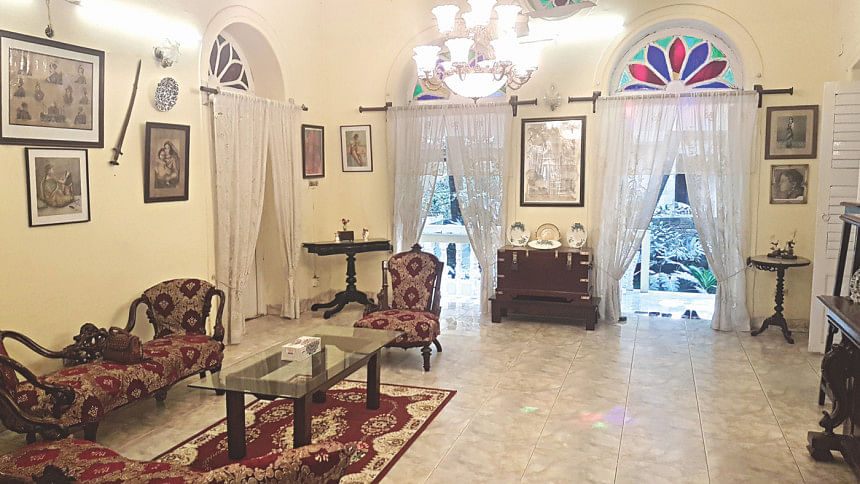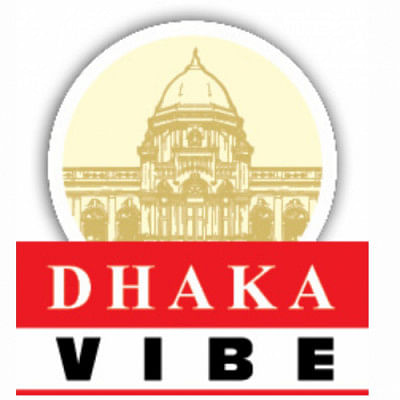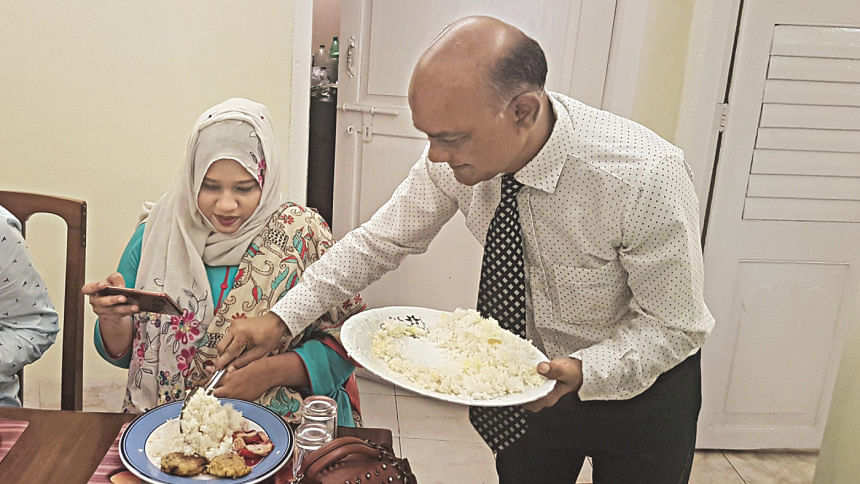Sharing heritage over a meal


Good food is personal and far reaching at the same time. It creates a bond, sheds light on values that are important to us, and reveals the perspective and way of life.
And what better way to relish that than in Old Dhaka, where history is held together not only in labyrinthine alleys or century-old architectures, but also in food and hospitality.
Food is and always will be a pivotal part of a rich tradition ingrained in the spirit of old town.
Being true to that spirit, an over 200-year-old zamindar house on Noor Baksh Lane at Becharam Dewri has opened its doors to guests, offering a scrumptious “lunch at Heritage Home”.
The two-storey house was built in the nineteenth century by Maulvi Abul Khairat Muhammad, a third generation zamindar of Dhaka and Sonargaon. AM Emran, the sixth-generation descendant of his family, now carries on the tradition of hospitality.
These correspondents visited the house, situated on over six-bigha land on a weekday afternoon -- that too unannounced. But Emran was least bothered. True to the tradition, he opened the door himself and greeted us.
A spacious garden, now divided by a boundary wall, welcomed us. This house named “Yousuf Castle” is divided in three parts -- one where Emran holds onto the past glory (around 1.5-bigha land), another where his relatives live while the other is being turned into a multi-storey building.
Noor Baksh Lane and Abul Hasnat Road are named after his ancestors.
The house may be old, but it is looked after with care, which becomes apparent amid the intricate designs on pillars and side railings. In the course of the day stained glass windows are often animated by changing light, while their patterns wander across the floor, inviting one’s thoughts to step back in time.
“Our home used to be famous for hospitality. Many eminent personalities either visited or stayed here,” said Emran, who worked in the aviation sector for decades.
He started the heritage meal from September 18, 2018 with the help of Urban Study Group (USG), an organisation campaigning for the conservation of architectural and urban heritage of Old Dhaka.
Lunch at Emran’s gradually became popular among people, including foreign dignitaries. They not only visit the home to partake in a journey of delicious delicacies, but also get a chance to admire the art and antiques preserved there.
Emran also showed us many of his prized possessions -- a gold-plated two-hundred-year-old Quran, chandelier, a rusty sword, rare handwritten books, array of attars (fragrant essential oils), crockeries and many more.
By this time, guests started to arrive. One of them was Nafia Nigar, an MBA student of Jahangirnagar University. She said she read about the heritage home on Facebook.
Her friend, Sohanur Rahman, a businessman by profession, was busy admiring a bed at the corner. “SM Sultan slept on that when he stayed here,” informed Emran.

Another guest, Kishwoer Amin, a chartered accountant, said, “There are many hidden gems in this part of the town. But in this case, visitors can actually step inside a home and relish the experience firsthand.”
The Dhanmondi resident was not even bothered by the heavy traffic she had to face. She also brought along her six-year-old daughter Yoshra Zahira.
Emran announced it was time for lunch -- which is after all highlight of the visit. We sat at the table, dating back to the days of Abul Khairat.
Emran served “jafrani polau” (saffron rice), “dimer shahi korma” (egg curry), “murgir chop” (fritters made with potato and minced chicken), “morog khana” (chicken roast), “chingri malai” (prawn curry), salad and borhani (traditional yogurt drink).
To finish off the gastronomic adventure on a high note, there’s also “zarda” (a sweet dish made with rice, milk and sugar).
The meal was delicious and aplenty, and most importantly Emran served us himself.
The menu also varies, he said. Guests can pre-order “anarash ilish” (hilsa with pineapple), “dolma” (edible leaf cooked with a filling of ground meat and herbs) or “kofta” (meatballs) as per the package they choose.
It’s homemade and cooked fresh. Emran’s wife and sisters prepare the food themselves. When asked whose cooking he prefers the most, Emran answered right away, “They are all excellent cooks.”
“This is our way of preserving our tradition,” said the father of three. “Heritage is more important than anything else. If you damage it, you will never get it back.”
To visit the house and enjoy a meal there, a guest will have to book two-three days ahead by visiting his Facebook page -- “Lunch at Emran’s Heritage Home”.
He said the money he makes from hosting the meals, he spends on maintenance of the house.
“This is not a restaurant. When you are here you’re family,” said Emran, a man proud of his ancestry, his neighbourhood and the city he fondly calls home.
‘HERITAGE MAGNET’
Taimur Islam, founder and chief executive of USG, said they regularly organise “Heritage Walk” to raise awareness for the conservation of old buildings and showcase the beauty of Old Dhaka.
“But what if you could step inside a house, talk to owners, spend time with them and witness how their ancestors lived while enjoying a homemade meal,” said the leading heritage activist of the country.
“Our target is to create such ‘heritage magnets’ in Old Dhaka. We are planning to introduce exhibitions and cultural activities along with meals to make the experience more enjoyable,” he added.
But it was not that simple, Taimur continued. “Residents of Old Dhaka are proud. They were not comfortable with the idea that guests would pay for hospitality. We had to convince them the earnings generated from this would help preserve their heritage.”
“We have taken a similar initiative at another home in Rokonpur. It’s called Qazi Bari. If we can start this in at least 10-15 places, people will be eager to spend a day in Old Dhaka with their families without any inhibition,” he hoped.
QAZI BARI
Steeped in heritage, the around 200-year-old Qazi Bari is a remnant of the city’s rich architectural legacy.
The family opened its doors to guests in 2019, offering not just traditional breakfast and lunch but also a peek into the past. Visitors can revel at the structure’s elegance and how it withstood the test of time.
The house is owned by Qazi Saad Ullah Hill Alim, a descendent of Mirza Elahi Baksh who build the house in early the 1800s. There is also a mosque inside the property, which is much older that the house itself, said Saad.
He said around three to four months back he got to know of USG. “They told me their plans regarding Old Dhaka and how they want to bring forward its heritage and history,” Saad said.
Many foreign and local guests have visited the place already, informed Saad. “We share our family history with them. We speak of our 400-500 years of attachment to this place and the history of this neighbourhood.”
They also get to relish the arts and antiques preserved at the house along with its architectural features.
Over the past 60 years, Qazi Bari has made a lot of contribution to country’s sports. Saad’s father Qazi Abdul Alim was not only a legendary athlete but also an expert in the field of physical training and a writer.
He received numerous accolades for his achievements as well as contributions to sports. He also received a Unesco award and holds the title of being the first person to receive such an accolade in the south-east Asia and Pacific region.


 For all latest news, follow The Daily Star's Google News channel.
For all latest news, follow The Daily Star's Google News channel. 



Comments